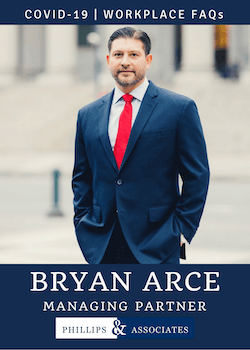New York City Lawyers for Wrongful Termination Claims

New York business have faced substantial disruptions due to the COVID-19 pandemic. Employers around New York State are required to take certain safety measures and enforce them among their employees. However, existing employment laws prohibiting discrimination remain in effect through the pandemic. Whether you can be fired because you have COVID-19 depends on multiple factors. At Phillips & Associates, our New York City wrongful termination attorneys may be able to help you determine whether there are viable claims with which they can help.
Can I Be Fired Because I Have COVID-19?
Many workers are, and have been, at risk of contracting COVID-19 at some point during the pandemic. Whether you can be terminated due to getting COVID-19 depends on many case-by-case factors. But you should note that COVID-19 may be regarded as a disability, or perceived disability, under federal, state, or local laws.
The Americans with Disabilities Act (ADA) has the most restrictive definition of a disability. Under the ADA, you have a disability if you have a mental or physical impairment that substantially restricts a major life activity. You are also protected if you have a history of this kind of disability, or an employer believes that you have this kind of disability, even though you do not. The impairment needs to be substantial. COVID-19 may be considered substantial, but this is not clear. To be protected from job discrimination by the ADA, you will need to satisfy the employer's requirements for the job and be able to perform essential job functions with or without reasonable accommodations.
The New York State Human Rights Law prohibits employment discrimination based on a disability. COVID-19 may be considered disabling under this definition. A disability under this law can include physiological, anatomical, neurological, or genetic conditions that stop the use of a normal bodily function or that can be demonstrated through medically accepted clinical or laboratory diagnostic techniques. People with a record of this type of impairment are also protected. People who are perceived by others as having an impairment are similarly protected. However, the definition of a disability under the state law is limited to conditions in which, if a reasonable accommodation is provided, an employee would not be stopped from performing job activities in a reasonable manner. The New York State Human Rights Law definition is broader than the definition under the ADA.
Under the New York City Human Rights Law, which is considered highly protective of workers, COVID-19 is likely to be regarded as a disability. The city law defines a disability as any medical, physical, psychological, or mental impairment or a history or record of that type of impairment. Impairments that count under the city law can include impairments of any bodily system, including those, like COVID-19, that affect respiration.
The New York City Commission on Human Rights has issued guidance articulating that COVID-19 is a disability protected under the city law. It sets forth that employers may violate the city law if they discriminate against or harass workers based on their actual or perceived COVID-19 infection status. Employers in the city can also be held accountable if they failed to provide reasonable accommodations or failed to engage in the cooperative dialogue about accommodations..
Your employer should not terminate you because of fears or stigma around your infection status or because of any other protected status that you may have. On the other hand, employers are supposed to take reasonable steps to protect the safety and health of the workplace and remain in line with local, state, and federal guidelines. In implementing these legal mandates in response to COVID-19, employers are supposed to take care to make sure that they are not discriminating against or harassing you because you have , or had, COVID-19.
Reasonable Accommodations
Your employer is required to provide you with reasonable accommodations for COVID-19, unless doing so would present an undue hardship for the business. The City Commission has stated that a reasonable accommodation in employment could involve allowing a worker with COVID-19 to work from home or work according to a modified shift schedule. The Commission has also stated that medical notes may be used to substantiate employees’ disability claims and requests for reasonable accommodations. However, your employer should waive requirements regarding medical notes until you can reasonably obtain documentation.
Coming Back to Work After COVID-19
The City Commission adopted the guidance of the Equal Employment Opportunity Commission (EEOC) on COVID-19 testing before employees go back to work. Under the New York City Human Rights Law, your employer is allowed to use medical testing, including temperature testing, to determine whether you present a direct threat to the workplace because of a COVID-19 infection. Your employer can also mandate that you provide proof that you are able to come back to the workplace safely after recovering from COVID-19, and show that you are not contagious any longer.
Contact Our Experienced Employment Attorneys
If you believe that you were terminated because you had COVID-19, you should talk to an experienced trial attorney. Phillips & Associates may be able to represent you. We assist workers in Brooklyn, Manhattan, Queens, Staten Island, the Bronx, and Nassau, Suffolk, and Westchester Counties, as well as New Jersey, Pennsylvania, and Florida. Call us at (866) 229-9441 or complete our online form.
